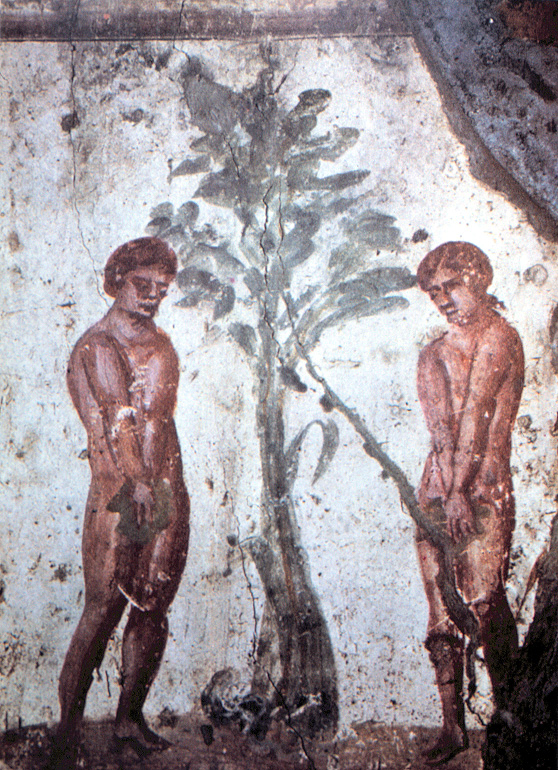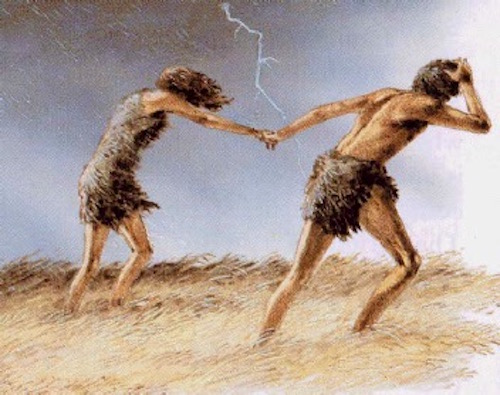Scripture Readings: Gen. 3:8-15; Ps. 130; 2 Cor. 4:13-5:1; Mark 3:20-35 Sermon by Michelle Fleming from Gen. 3:8-15 and 2 Cor. 4:13-5:1
Know Your Limits
Introduction
No Boundaries, Limitless, Breaking Through—these could easily be titles of three New York Times bestselling books. All three titles reflect our insatiable desire for inexhaustible strength and the unfettered ability to fulfill our wildest dreams.
Our culture inundates us with lies, constantly hawking products and lifestyles that promise to make us better, faster, stronger, happier, healthier, wealthier. But the reality is that we humans are extremely limited, and we are dependent upon a gracious God for our very breath. Without the air he provides, we won’t survive more than about three minutes; without water, more than about three days; without food, more than about three weeks. And if we go a few miles above or below sea level, we’ll die within a few minutes. No boundaries? No limits? Hardly.
But the limits we experience are gifts from a benevolent God who created a perfect environment for us within those limits—not only that we might survive, but that we would thrive. The boundaries God has given are for our good and his glory. Like a parent protecting a toddler from a hot stove, or from the edge of a cliff, the boundaries God gives us are for our protection—given to keep us out of danger.
The tendency we have to want to live without limits is the human story. Believing the lie that we don’t need limits is what caused Adam and Eve to fall prey to Satan’s schemes. God gave them every plant in the Garden of Eden for food except one. In eating the forbidden fruit, they shifted the human story. Breaking through the limits God gave brought shame and suffering, not only to them, but to the whole of humanity.

After eating the forbidden fruit, Adam and Eve hid in shame, but our loving God, who relentlessly pursues us all, went looking for them:
Then the man and his wife heard the sound of the Lord God as he was walking in the garden in the cool of the day, and they hid from the Lord God among the trees of the garden. But the Lord God called to the man, “Where are you?” He answered, “I heard you in the garden, and I was afraid because I was naked; so I hid.” (Gen. 3:8-10)
God explained that because Adam and Eve had gone beyond the boundary he had set for them, suffering would come upon all humanity. But then God showed his unfailing love for humankind by covering their nakedness to reduce the shame they were feeling. Whereas they had made coverings for themselves of plants, God provided coverings made of animal hides—a way of pointing forward to the ultimate covering of their sin through the sacrifice of God’s Son, Jesus Christ.

To cover our sins—our going beyond the limits God set for our good—God sent his incarnate Son Jesus to earth as the second Adam to live the perfect life we could not. Taking upon himself our sin and shame, he suffered our death on the cross. In doing so, he submitted to the Father’s perfect will on our behalf. And now, as we await Jesus’ return in glory, we participate, through the Spirit, in the work Jesus is doing to spread the Father’s kingdom in the world. As Paul notes in today’s reading in 2 Corinthians, as we participate, we often face hardships that involve suffering. Yet, we are not ashamed, we are not downcast, we are not destroyed. Why? Paul gives the answer out of his own experience:
…Because we know that the one who raised the Lord Jesus from the dead will also raise us with Jesus and present us with you to himself. All this is for your benefit, so that the grace that is reaching more and more people may cause thanksgiving to overflow to the glory of God. Therefore we do not lose heart. Though outwardly we are wasting away, yet inwardly we are being renewed day by day. For our light and momentary troubles are achieving for us an eternal glory that far outweighs them all. So we fix our eyes not on what is seen, but on what is unseen, since what is seen is temporary, but what is unseen is eternal. For we know that if the earthly tent we live in is destroyed, we have a building from God, an eternal house in heaven, not built by human hands. (2 Cor. 4:14-5:1)
Paul emphasizes that the trials we encounter in this life are temporary, but the glory God is sharing with us is forever! Beyond our time of trial is not just a season of goodness, but an eternity of good. Paul is thus encouraging us to look at our lives with an eternal mindset—focused on the joy we have with Jesus, knowing that God redeems all things and gives us the grace that we need to get through the most difficult of times.

Paul wrote this letter to the church in Corinth at a time that was particularly trying for him. He was being unfavorably compared to other preachers who were more charismatic and gifted. These preachers were spreading false claims about Paul and preaching false gospels. Rather than being destroyed by these troubles, Paul humbly continued to do what God had called him to do—present the true gospel. Rather than throwing his weight around as an apostle, Paul operated within the limits God had defined for him, patiently continuing to serve Christ by caring for God’s people in Corinth and elsewhere.
Like a caring father, Paul warns the believers in Corinth to not get caught up in playing favorites—to not classify and compare, but to understand that all of us are recipients of the same grace in Christ. None can or should boast about anything other than Christ! Later in this letter, Paul notes the limitations God had given him, including what he calls a “thorn in the flesh.” Though he asked God to remove it, when God answered no, he came to see the limitation as a gift rather than a burden:
Now I take limitations in stride, and with good cheer, these limitations that cut me down to size—abuse, accidents, opposition, bad breaks. I just let Christ take over! And so the weaker I get, the stronger I become. (2 Cor. 12:9-10, The Message Bible)
As with Paul, when we are unable, Christ shows up, fully able to give us the grace we need. What limitations are you struggling with? Perhaps a lack of energy, time, capacity? Perhaps distractions, grieving, burnout? May I encourage you to see these limitations as opportunities to turn to God—to commune with him, to rest in Christ, to receive God’s supernatural strength as a gift from the Spirit.
Note to preacher: Here is a good place to share your personal story about limits and struggles you've faced that have led you to turn to God for help. This does not always mean that God performed what you had been trying to do. Sometimes it means that it didn’t get done at all, and you learned that it didn’t have to be done.
Let us, like Paul, see our troubles as motivation to turn to God, to commune with him, accepting with joy the boundaries, the limitations, that God has placed on our lives. Rather than chafing against and grieving these limiting circumstances, let us, like Paul, focus on Christ and on what he is doing, by the Spirit, in and through us.
A common reason for us to live beyond the limits God has set for us is that we focus on what we are doing rather than on what God is doing. It is important that we spend time with God, discerning what he is doing and how he is calling us to participate. God is not calling us to be all things to all people. He sets limits for us, ones always centered on Christ and always for our good and the good of others. Saying yes to God involves joyfully receiving what he gives us, within the limits he sets, then sharing those gifts with others.
I encourage you to take some time this week to reflect on these questions:
- What limits am I currently wrestling with?
- In what areas am I being called to say yes to God within those limits?
- In what areas am I being called to more fully surrender to God?
[Close with prayer.]



Please note that comments are moderated. Your comment will not appear until it is reviewed.